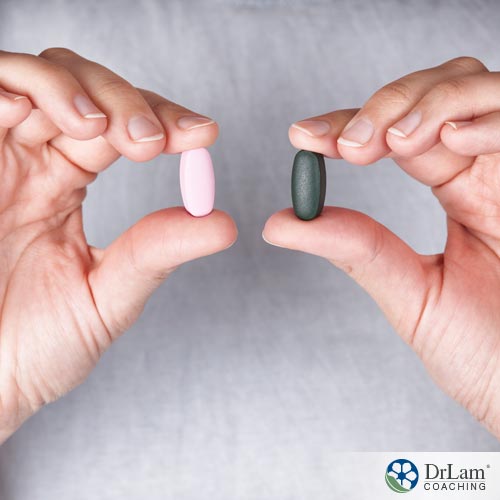
 Adrenal Fatigue Syndrome (AFS) is no fun we all know that. It can really take a toll on the body and mind. You are likely looking for solutions to improve your mental clarity and the health of your NeuroEndoMetabolic (NEM) Stress Response. A few of the popular health supplements you may have run into are phosphatidyl choline, serine, and phosphorylated serine. But what is the difference between them? Are these supplements actually good for you if you are afflicted with AFS? Each of these are touted about as amazing supplements, but what's the truth? Let's find out.
Adrenal Fatigue Syndrome (AFS) is no fun we all know that. It can really take a toll on the body and mind. You are likely looking for solutions to improve your mental clarity and the health of your NeuroEndoMetabolic (NEM) Stress Response. A few of the popular health supplements you may have run into are phosphatidyl choline, serine, and phosphorylated serine. But what is the difference between them? Are these supplements actually good for you if you are afflicted with AFS? Each of these are touted about as amazing supplements, but what's the truth? Let's find out.
Phosphatidyl Choline or (PC) is a phospholipid which is attached to a choline particle. This compound acts as a necessary component in each and every cell of the human body. Though this compound is often referred to as lecithin, that is not entirely accurate.
Studies appear to point toward this compound supporting a healthy liver in several different ways. Furthermore, it may even help to lower cholesterol. In extensive studies by scientists, this lipid has been shown to play important roles in many areas.
These include:
PC is integral to the makeup and repair of cell membranes. It is present in every cell of the body. This compound is also vital for healthy liver functions. Some research indicates that liver support is perhaps its strongest role. It may be preventative for many forms of toxicity and liver disease. PC appears to protect the liver cells from a range of damaging conditions like fibrosis, cell death caused by drug use, damage from alcohol, and chemical toxins.
Some studies have even shown PC could also have protective, and even has healing effects on patients that have hepatitis A, B or C. One such study was published in the journal Liver. It was found during this study when PC was administered to individuals who were suffering from chronic hepatitis; supplementation resulted in a significant reduction of the activity of the disease. This, however, is not entirely conclusive.
 A second study from the journal Alcoholism: Clinical and Experimental Research, showed the use of PC resulted in the protection of rat liver cells from toxicity caused by alcohol. The authors of the study hypothesize that this was related to choline’s antioxidant activities.
A second study from the journal Alcoholism: Clinical and Experimental Research, showed the use of PC resulted in the protection of rat liver cells from toxicity caused by alcohol. The authors of the study hypothesize that this was related to choline’s antioxidant activities.
In one last study in the publication, Hepatology, it was revealed that patients with low choline levels could possibly reverse in some instances fatty liver disease, through simple choline supplementation.
Liver health is vital to the detoxification circuit of the NEM stress response. A health detoxification circuit will reduce toxic burdens on the body and reduce stress and inflammation.
PC is also a major compound responsible for producing the protective mucus layer that covers the gastrointestinal tract. When used properly it can mitigate GI injury through anti-inflammatory actions.
Emerging studies hinted that PC might actually protect the intestinal lining and the stomach from the damaging effects that are often caused by using non-steroidal anti-inflammatory drugs (NSAID). Two rodent studies tested what would happen if PC is used in conjunction with naproxen. The results appeared to indicate that the combination resulted in significantly less intestinal bleeding and GI damage while maintaining naproxen’s anti-inflammatory activity.
The NeuroEndoMetabolic (NEM) Stress Response is a unique way at looking at your bodies’ health. The NEM network is broken up into six major circuits which include: the metabolic, cardionomic, hormonal, cardionomic, inflammation, and neuroaffect networks. These finely balanced circuits rely on one another to function as a healthy whole. The proper function of all 6 circuits manifests itself as a healthy body.
Adrenal Fatigue Syndrome or (AFS) occurs when too much work has been required of the adrenal glands over long periods of time. Stress hormones can be stimulated by outside influence, but can also be triggered by one of the 6 NEM circuits internally. The adrenal glands produce hormones designed to make us escape danger. But in modern society, our bodies may often feel the need to respond to danger.
This constant overproduction of hormones wears out or fatigues the adrenal glands, and as a result, they burn out and can’t produce as much hormone as the body needs. It is important to address AFS early, or the results could get worse.
 Any kind of stress internal or external should be avoided at all costs in order to avoid or reverse AFS. Fortunately, AFS can be likely be alleviated in most cases. This involves diligent work in order to live a healthier, less stressful lifestyle. So how does phosphatidyl choline play into that process?
Any kind of stress internal or external should be avoided at all costs in order to avoid or reverse AFS. Fortunately, AFS can be likely be alleviated in most cases. This involves diligent work in order to live a healthier, less stressful lifestyle. So how does phosphatidyl choline play into that process?
When the liver or GI tract is irritated, the inflammation stress response kicks in. Your body’s attempt to heal triggers this response inflammation, which results in inflammation. Inflammation causes further irritation and can make things worse, and eventually triggers other stress response circuits, which cause the adrenal glands to pump out cortisol and adrenaline.
Your neuroaffect response is then activated, and the cycle goes on and on. That is where PC may come into play. If the emerging research surrounding PC turns out to be accurate, it can mean that PC can actually prevent inflammation parts of the body. This would have a major impact on the NEM stress response, possibly nipping it in the bud, and saving your body from a world of further issues.
Additionally, the promising use for liver health would also help the Detoxification circuit. If PC can prevent liver damage, it could have a great impact on the entire NEM system. When the NEM system operates properly, your adrenal glands can then stop ringing the alarms.
So what about Phosphatidyl serine or PS? PS is also an important phospholipid which is found in all cell membranes. This phospholipid is mostly found in cell membranes of the brain. PS can also help the body in regulating hormone levels. It specifically affects the levels of cortisol as well, which is an important hormone produced by the adrenal gland.
Cortisol is a hormone which is produced when the body is stressed. It acts as part of the “fight or flight” response regulated by the adrenal glands. Though this hormone is an essential part of survival, constant stress can cause an overabundance of cortisol in the body. PS works to counter this overproduction by aiding the body to achieve homeostasis. PS is able to help the body reduce excess cortisol levels. This may even help to alleviate the symptoms of anxiety. These same effects may even aid in weight loss when weight gain is caused by cortisol imbalance.
Unlike PC, this phospholipid is not found in high levels in normal foods. It is only found in high quantities in animal organs, especially the brain. But if eating cow brains is not your thing, fortunately there are plant-based supplements like those extracted from sunflower seeds or soybeans.
 In many cases, people actually find that this supplement dulls the feeling of anxiety. PS had been found by many to relieve stress and the symptom of anxiety. Anxiety is mainly caused by the NEM system's response to fear. Because PS helps correct this imbalance by balancing cortisol levels in the body, it may actually alleviate anxiety. Many people have found that taking PS 45 minutes before bed, can calm the NEM stress response and fall asleep more easily.
In many cases, people actually find that this supplement dulls the feeling of anxiety. PS had been found by many to relieve stress and the symptom of anxiety. Anxiety is mainly caused by the NEM system's response to fear. Because PS helps correct this imbalance by balancing cortisol levels in the body, it may actually alleviate anxiety. Many people have found that taking PS 45 minutes before bed, can calm the NEM stress response and fall asleep more easily.
PS is well known to increase serotonin production in the brain. Many people find they need less antidepressant medications when they use PS in conjunction with their medication. This, of course, should only be done under the care and supervision of your healthcare provider.
So as you can imagine this supplement can have a tremendous effect on the neuroaffect circuit of the NEM stress response. Anxiety and depression can be triggered by a range of hormonal responses. Serotonin is a hormone that can improve this circuits health and as a result, our mood and feelings. Serotonin production is linked to mental health and wellbeing. Because PS can stimulate serotonin production, it can pacify this stress response circuit. Depending on whether or not your AFS is related to anxiety or depression, or if they are a symptom of another stress response, PS may be able to balance the neuroaffect circuit. If, however, your neuroaffect is being triggered by inflammation or metabolic circuits, PS may not have much of an effect overall.
Furthermore, this phospholipid’s ability to maintain healthy cortisol levels may have the biggest impact overall on the hormonal stress response, and of course the adrenals themselves. This can mean that PS could be effective at balancing and improving both the hormonal and neuroaffect circuits.
There is another form of serine known as phosphorylated serine. This form is slightly different from phosphatidyl serine (PS) and is touted as a great regulator of cortisol. Phosphorylated serine is able to act quicker in the body and typically more affordable as well.
Both of these phospholipids, or phosphate based acids, perform essential functions in the body, and more specifically the cell membranes.
Phosphatidyl choline is an essential chemical when it comes to brain cell reproduction, and can help improve focus, as well as concentration. PC has effects that possibly enable it to pacify the inflammation and metabolic stress response circuits of the NEM stress response.
Phosphatidyl serine is found in the membranes of all cells and is found in very high quantities in the cells of the brain. PS can have the effect of calming the neuroaffect and hormonal circuits of the NEM stress response.
 So really the answer depends on what is triggering your AFS. If your GI tract or Liver are triggering the metabolic or inflammation circuits of your NEM PC may be better for you. If, however, your AFS trigger is, in fact, arising from the neuroaffect or hormonal stress responses, PS may be more of your thing. If both your inflammation circuit and neuroaffect, or your metabolic and neuroaffect are being triggered for example, maybe a combination of the two would suit you.
So really the answer depends on what is triggering your AFS. If your GI tract or Liver are triggering the metabolic or inflammation circuits of your NEM PC may be better for you. If, however, your AFS trigger is, in fact, arising from the neuroaffect or hormonal stress responses, PS may be more of your thing. If both your inflammation circuit and neuroaffect, or your metabolic and neuroaffect are being triggered for example, maybe a combination of the two would suit you.
If these 4 circuits metabolic, neuroaffect, hormonal, or inflammatory stress responses are not the cause of your AFS, perhaps you would not receive much of a benefit from either.
It is hard to say which is better. It is really about which is better for you. Both of these supplements have a lot of research that appears to back up many of the claims that have surrounded them for many years. The choice about which to take is really up to you and your healthcare provider.
Absolutely no supplement is a cure-all for AFS. Neither P. serine or P. choline are enough on their own to turn AFS around. Treating AFS takes time, patience and a varied diet rich in whole foods. If you are taking medication for anxiety or depression, do not replace them with any supplement without first consulting with your healthcare provider. Always do as much research as you can in order to be as prepared as you need to be when making any decision such as adding a supplement to your regiment.
Both P. Serine and P. choline are excellent supplements. They have benefits for many people that have been afflicted with AFS and may serve to balance your metabolic, inflammatory, hormonal and neuroaffect circuits, of the NEM stress response. These supplements both have a surprising amount of evidence supporting them as well. If you are looking to improve the health of your NEM stress response, both of these supplements are a good place to look. These supplements do show a lot of promising results, so it is no surprise that there is so much hype around them. They are definitely worth looking into.
© Copyright 2018 Michael Lam, M.D. All Rights Reserved.
There is actually a lot of research surrounding supplements like phosphatidyl choline, serine and, phosphorylated serine. Here’s the thing, based on the studies some actually appear to be worth a look. Each one has unique properties that are worth noting.
